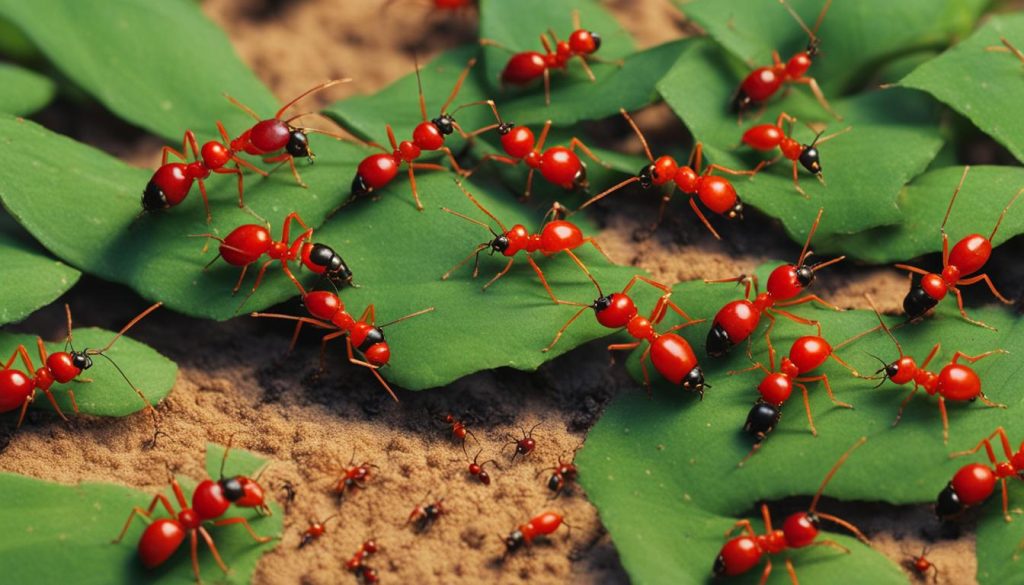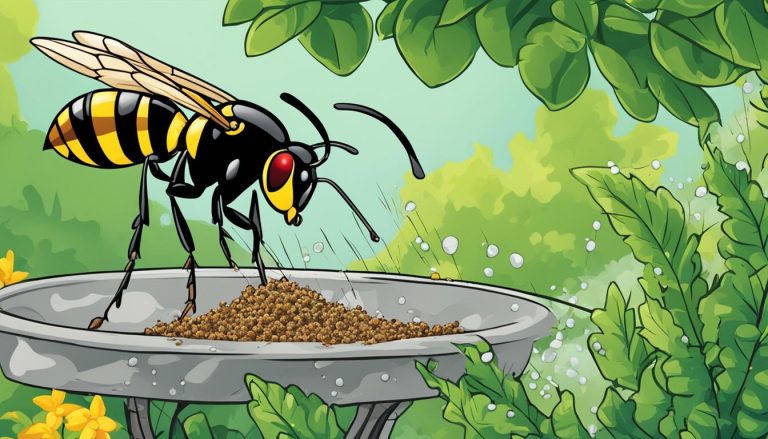G’day! If you’ve got a problem with fire ants, you know they’re no good for your garden and a real pain if they bite. And if you’ve got kids or furry friends running around, you might not want to use those harsh chemicals to get rid of the ants. No worries! There are some ripper ways to keep those fire ants at bay without harming the planet. We’re talking about eco-friendly fire ant control that’s safe for everyone.
We can use what nature gave us to fight back. Mate, these natural fire ant control methods are not only smart; they’re organic and really good for the Earth. Using stuff like common kitchen spices or even some plants from your garden, you can create your own organic fire ant control right at home. It’s about being clever without the chemicals!
Let’s make it easy to handle these pesky invaders without stress. Keep reading to find the top tips for handling fire ants the natural way.
Natural Fire Ant Control without Chemicals
To naturally get rid of fire ants, you can use various DIY methods without chemicals:
- Soapy water: Mix dish soap with water and spray it directly on fire ants.
- Vinegar: Use equal parts of vinegar and baking soda as a repellent.
- Ant paste: Create a paste with flour, boric acid, sugar, and water to deter ants.
- Salt: Sprinkle salt around ant-infested areas or create a saltwater spray.
- Boiling water: Pour boiling water on ant mounds to kill them.
- Diatomaceous earth: Sprinkle this powder to dehydrate and kill ants.
- Lemon water: Mix water and lemon juice to spray on ants.
- Cayenne pepper: Make a liquid from cayenne peppers to repel ants.
These natural methods can help control fire ant infestations without the use of chemicals.
Sources:
Understanding Fire Ants and Chemical-Free Control Options
When dealing with fire ants, it’s important to combine knowledge about their behaviour and the environment with eco-friendly practices. This holistic fire ant control approach ensures your garden is not only safe from these pesky intruders but also remains a green, chemical-free zone.
Recognising Fire Ant Behaviour and Habitats
Fire ants thrive in disturbed lands, making unkempt gardens a perfect breeding ground. A sustainable fire ant control tactic is to maintain your outdoor spaces, ensuring food residue is non-existent as it attracts these invaders. Taking steps to understand their foraging activities is a cornerstone of environmentally friendly fire ant control.
Natural Ingredients That Deter Fire Ants
Turning to nature’s pantry can serve as a non-toxic fire ant control technique. Utilise green fire ant control alternatives such as:
- Cayenne pepper
- Cinnamon
- Coffee grounds
- Citrus peels
These ingredients can be strategically deployed to discourage fire ants from encroaching on your territory.
Effective DIY Solutions for Fire Ant Management
Do-it-yourself solutions can often rival the effectiveness of store-bought chemical alternatives. Here are some natural fire ant control methods:
- Mix dish soap with citrus oil for a mound-treating solution
- Apply hot or soapy water directly to the ant hill
Yet, it’s advised to proceed with caution to avoid harming beneficial garden elements.

| Natural Repellent | Ingredients | Application |
|---|---|---|
| Ant Deterrent Spray | Peppermint, citrus, tea tree oils | Mix with water and spray around ant-prone areas |
| Ant Mound Drench | Dishwashing liquid, citrus oil | Pour mixture directly on ant mounds |
| Barrier Creation | Cinnamon, coffee grounds | Spread around garden perimeter |
Fire Ants Control Without Chemicals
Striking a balance between efficacy and safety in ant control can be quite the challenge. However, numerous eco-friendly fire ant control strategies take centre stage in the battle against these unwelcome guests without the need for harsh chemicals. Getting to know these methods isn’t just beneficial for the environment but also for our health and that of our pets.
Home Remedies and Their Effectiveness
Tackling fire ants through organic fire ant control methods is a popular choice amongst those striving for a more holistic fire ant control approach. Yet, while each remedy differs in its effectiveness, it’s essential to understand that very few provide the long-term control needed to completely eliminate a colony.
- Boiling water – May kill ants on contact but risks harming nearby plants and grass.
- Baking soda and vinegar – Useful as a spot treatment but does not address the entire colony.
- Citrus peel extracts – Act as a deterrent rather than a killing solution.
These methods are best seen as a temporary fix that might deter foraging ants or eliminate a portion of the workers, yet they fall short of reaching and eliminating the queen—key to ending the lifecycle of the colony.
Sustainable Practices for Long-Term Fire Ant Suppression
Sustainable fire ant control looks towards ecological harmony, where natural predators play an essential role. Cultivating an environment where these natural adversaries can thrive may contribute significantly to controlling fire ant populations.
- Encouraging native ant species that compete with fire ants for resources.
- Attracting insectivorous birds with feeders and bath.
- Gardening with plants that attract beneficial insects that prey on fire ants.
By promoting these indigenous predators and maintaining a balanced ecosystem, one can naturally reduce the impact fire ants have within our homes and gardens.
Pros and Cons of Non‑Chemical Fire Ant Treatments
The shift towards environmentally friendly fire ant control has highlighted the benefits and drawbacks of forgoing chemicals in favour of more natural solutions:
| Method | Pros | Cons |
|---|---|---|
| Diatomaceous earth | Non-toxic, causes dehydration and death in ants | May harm beneficial insects, requires dry conditions to be effective |
| Botanical insecticides | Derived from plants, generally safer for humans and pets | Can still affect non-target species, careful application needed |
| Physical barriers | Safeguards specific areas without harm | Only a preventive measure, doesn’t eliminate existing colonies |
While they are unquestionably safer for the environment and personal health, the pursuit of organic fire ant control methods often demands more patience and perseverance than their chemical counterparts. Thus, their adoption should be part of a comprehensive plan that may include a combination of treatments for maximum effect.

Ultimately, seeking out strategies that promote safety, sustainability, and respect for the natural world is at the heart of a more responsible approach to managing fire ant invasions. It’s essential to weigh the pros and cons and consider the integration of various methodologies for a well-rounded fire ant management plan.
Conclusion
In summary, dealing with fire ants doesn’t have to mean reaching for harsh chemicals that could harm our environment, pets, or little ones. Instead, focusing on green fire ant control is not only safer but also fosters a more balanced ecosystem. By getting to know these critters’ habits and where they live, we can keep them at bay using non-toxic fire ant control tactics.
Adopting chemical-free fire ant control methods may require a bit more effort than applying commercial products, but the long-term benefits are clear. We protect the varied and vibrant life in our gardens and homes, ensuring that our actions don’t disrupt the delicate balance of nature. Plus, using natural remedies often means we’re using resources that are already at our fingertips – safe, effective, and kind to the planet.
Whether we’re sowing plants that ants find off-putting or we’re concocting a homemade citrus oil concoction, it’s reassuring to know that we can manage these pests in a way that looks after both our health and the health of the Australian environment. Remember, a careful combination of preventative measures, natural deterrents, and savvy management is the key to keeping fire ants in check without resorting to harmful substances.
FAQ
What are some natural methods for controlling fire ants without chemicals?
You can deter fire ants using natural ingredients like cayenne pepper, cinnamon, coffee grounds, and citrus peels. Essential oils such as peppermint, citrus, and tea tree oil mixed with water also serve as effective repellents. Moreover, DIY solutions like a mixture of dishwashing liquid and citrus oil can help manage fire ant mounds.
Why is it important to understand fire ant behaviour and habitats for chemical-free control?
Knowing where fire ants thrive and their foraging habits is key to preventing their infestation. By maintaining clean surroundings and avoiding food spills that can attract ants, you create an environment that is less appealing to fire ants, thereby helping to control their population without chemicals.
Can boiling water be used to control fire ant mounds?
Boiling water can be poured over fire ant mounds as one of the home remedies, but it is only partially effective and comes with risks, such as potential burns to the user and harm to vegetation around the mound. It’s also important to note that boiling water might not eliminate the entire colony.
What are the pros and cons of non-chemical fire ant treatments?
Non-chemical treatments are safer for pets, children, and the environment. They can include ingredients commonly found at home or botanical insecticides that don’t contain synthetic chemicals. The downside is that these methods might not always be sufficient to eradicate fire ant colonies entirely, and their effectiveness can vary.
How can encouraging natural predators contribute to fire ant control?
Fostering an environment that supports the natural predators of fire ants, such as native ants, birds, lizards, and various insects, can help keep the fire ant population in check. Native ants especially compete with fire ants for resources, suppressing their numbers naturally.
Are botanical insecticides and diatomaceous earth effective against fire ants?
Yes, botanical insecticides and diatomaceous earth can offer safer alternatives to synthetic chemicals in controlling fire ants. However, they must be applied carefully and knowledgeably, as their effectiveness may be influenced by application method and environmental conditions.






